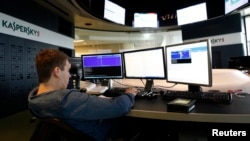Russian cyber security firm Kaspersky Lab, reacting to a U.S. government move restricting its activities, said on Wednesday it had fallen victim to U.S.-Russia global sparring while the Kremlin criticized the U.S. action as politically-motivated.
The Trump administration on Tuesday removed the Moscow-based firm from two lists of approved vendors used by government agencies to purchase technology equipment, amid concerns its products could be used by the Kremlin to gain entry into U.S. networks.
"By all appearances, Kaspersky Lab happened to be dragged into a geopolitical fight where each side is trying to use the company as a pawn in its game," RIA news agency quoted the company's press service as saying.
Company head Eugene Kaspersky has more than once proposed meeting U.S. government officials and has offered to testify to the U.S. Congress "to respond to all questions from the U.S. government that may arise," it was quoted as saying.
Kaspersky products have been removed from the U.S. General Services Administration's list of vendors for contracts that cover information technology services and digital photographic equipment, an agency spokeswoman said in a statement.
GSA's priorities "are to ensure the integrity and security of U.S. government systems and networks," the spokeswoman said.
Government agencies will still be able to use Kaspersky products purchased separately from the GSA contract process.
‘Politicized decision’
The Kremlin said on Tuesday it regretted the U.S. move against Kaspersky Lab, adding: "We certainly believe that this is a politicized decision."
"This is an absolutely commercial company which provides commercial services which are not only competitive but are super-competitive globally," Kremlin spokesman Dmitry Peskov told a conference call with reporters.
Kaspersky's anti-virus software is popular in the United States and around the world, and the firm has been a leading player in the cyber security market for decades.
"Russia as a state will continue to spare no effort to protect the interests of our companies abroad," Peskov said.
U.S. lawmakers have raised concerns that Moscow might use the firm's products to attack American computer networks, a particularly sensitive issue given allegations by U.S. intelligence agencies that Russia hacked and leaked emails of Democratic Party political groups to interfere in the 2016 presidential election campaign.
Russia denies the allegations.





